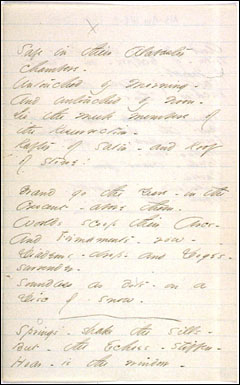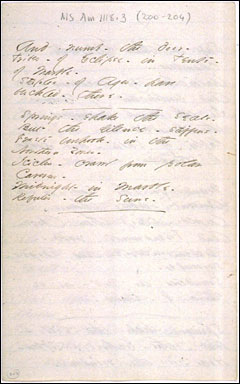It’s a poetry controversy! These are rare and I can’t pass up an opportunity to weigh in on Tony Hoagland’s essay on the necessity of meanness in poetry. I agree with Jim Henley and Eve Tushnet (scroll down to “Golden Mean,” Blogspot archives hosed as usual) that “meanness” is not the right word. Jim suggests “savagery” or “ruthlessness,” but I don’t find those quite satisfactory either. I propose “hatred.”
Love is blind, hate never. Hate clarifies, and great poets hate with excellent reason, as Yvor Winters tactlessly points out:
During the Romantic movement a great deal of sentimental nonsense was written about the isolation of the artist, and the nonsense usually verges on self-pity… The fact remains, however, that the artist, if he really is an artist, is really isolated, and his personal life in this respect is a hard one. There are few people with whom he can converse without giving offense or becoming angry. It is no accident that so many great writers have sooner or later retreated from society: they retreat because they are excluded. A first-rate poet differs from his contemporaries (and I include those who think of themselves as literary contemporaries) not in being eccentric or less human, but in being more central, more human, more intelligent. But the difference in this respect between, let us say, a great poet and most distinguished scholars is very great, and few scholars are distinguished; and the scholar cannot recognize the difference and is scarcely prepared to admit the possibility of the difference, for he regards himself as a professional man of letters. To the scholar in question, the poet is wrong-headed and eccentric, and the scholar will usually tell him so. This is bad manners on the part of the scholar, but the scholar considers it good manners. If the poet, after years of such experiences, loses his temper occasionally, he is immediately convicted of bad manners. The scholar often hates him (I am not exaggerating), or comes close to hating him; but if the poet returns hatred with hatred (and surely this is understandable), he is labeled as a vicious character, for, after all, he is a member of a very small minority group.
This passage is not free from self-pity either, but it is salutary to be occasionally reminded by our betters how they really see us. The overwhelming fact in the life of any great poet is impenetrable human stupidity, yours and mine. Emily Dickinson did not spend her life in her room because she was a crazy lady.
Some of the greatest poetry in English is hate poetry, although you’d never guess it from Hoagland’s limp examples. Proceeding by century, from the 16th we have Ralegh’s The Lie, Gascoigne’s Woodmanship, and Ayton’s To an Inconstant One. From the 17th, Jonson’s Ode to Himself (“Come, leave the loathed stage”) and Dryden’s MacFlecknoe. Paradise Lost is an interesting case. God, whom Milton loves but cannot see, is a bore: Satan, whom he hates and sees all too clearly, comes to life. This is the truth behind Shelley’s remark that Milton was of the devil’s party without knowing it.
The best English poem of the 18th century is Churchill’s Dedication to Warburton, a savage attack on a literary bully and fraud. (It’s unavailable on the web; if someone asks nicely I’ll post it.) Honorable mention to The Dunciad and Verses on the Death of Dr. Swift. In the 19th century vituperation seemed to go out of fashion; but the 20th yields up Bogan’s Exhortation, J.V. Cunningham’s Ars Amoris and “Hang up your weaponed wit”, Winters’ own Danse Macabre. This is more or less off the top of my head. You’d be hard-pressed to produce a list of love poems of comparable quality.
And always remember, when you read these poems, that it’s you and me they’re talking about.
(Update: Jim Henley comments.)


